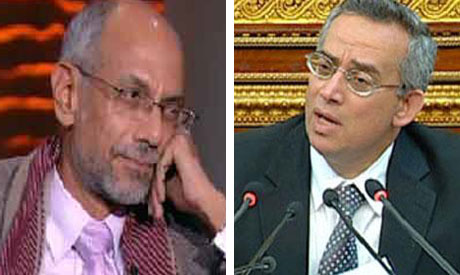
Member of Egyptian President Mohamed Morsi's advisory team Ayman El-Sayad on Sunday took a swipe at recent calls by ex-MP and Muslim Brotherhood member Hassan El-Brins for a one-month boycott of internet giant Google to protest the latter's refusal to remove a controversial anti-Islam film from its online video platform YouTube.
The short film, which denigrates Islam and the Prophet Mohamed, sparked violent demonstrations across the region last week.
"Is someone really calling to boycott Google? I didn't think this could be done by someone who realises we're in the 21st century," El-Sayad declared via Twitter on Saturday.
Earlier on Saturday, El-Brins, on his Facebook page, had urged Egyptians to stage a month-long boycott of the popular, California-based internet-services company.
"For one month, we should use other search engines as a disciplinary measure against Google," El-Brins asserted.
He went on to urge the "millions of Muslims working in the programming field" to create "a new search engine to compete with Google."
"Egypt's revolutionary government will support the creators of a rival search engine," El-Brins asserted. "What's important is to start now. The information industry is a battlefield, from which Google earns billions."
Last Wednesday, thousands of angry protesters converged on the US embassy in Cairo's Garden City district to denounce the controversial film. This was followed by five days of clashes between demonstrators and security forces, in which two protesters were killed, some 200 injured and at least 260 arrested, according to the latest reports.
On Friday, Google rejected a White House request to reconsider its decision to keep the controversial movie clip on its YouTube video platform.
El-Brins, for his part, blasted the decision.
"If a Muslim produced a film deemed offensive to Jews or the Holocaust, would Google's response to the angry Zionist lobby be the same?" El-Brins asked in an interview with Al-Ahram's Arabic-language news website. "On the contrary, it would hasten to take the film offline rather than face the wrath of the Zionist lobby."
In a Friday statement, Google said it was restricting the short film in certain Muslim countries, if only to comply with local laws – not as a response to political pressure.
"We've restricted access to [the film] in countries where it is illegal, such as India and Indonesia, as well as in Libya and Egypt, given the very sensitive situations in these two countries," the company stated. "This approach is entirely consistent with principles we first laid out in 2007."
Egypt's Muslim Brotherhood, for its part, called for mass protests in Cairo's Tahrir Square last Friday to condemn the film, but subsequently withdrew the call after earlier protests in front of the US embassy turned violent.
The Muslim Brotherhood's Freedom and Justice Party, for its part, of which El-Brins is a member, issued a statement on Thursday supporting peaceful protests against the film and demanding legislation criminalising defamation of the divine faiths.



